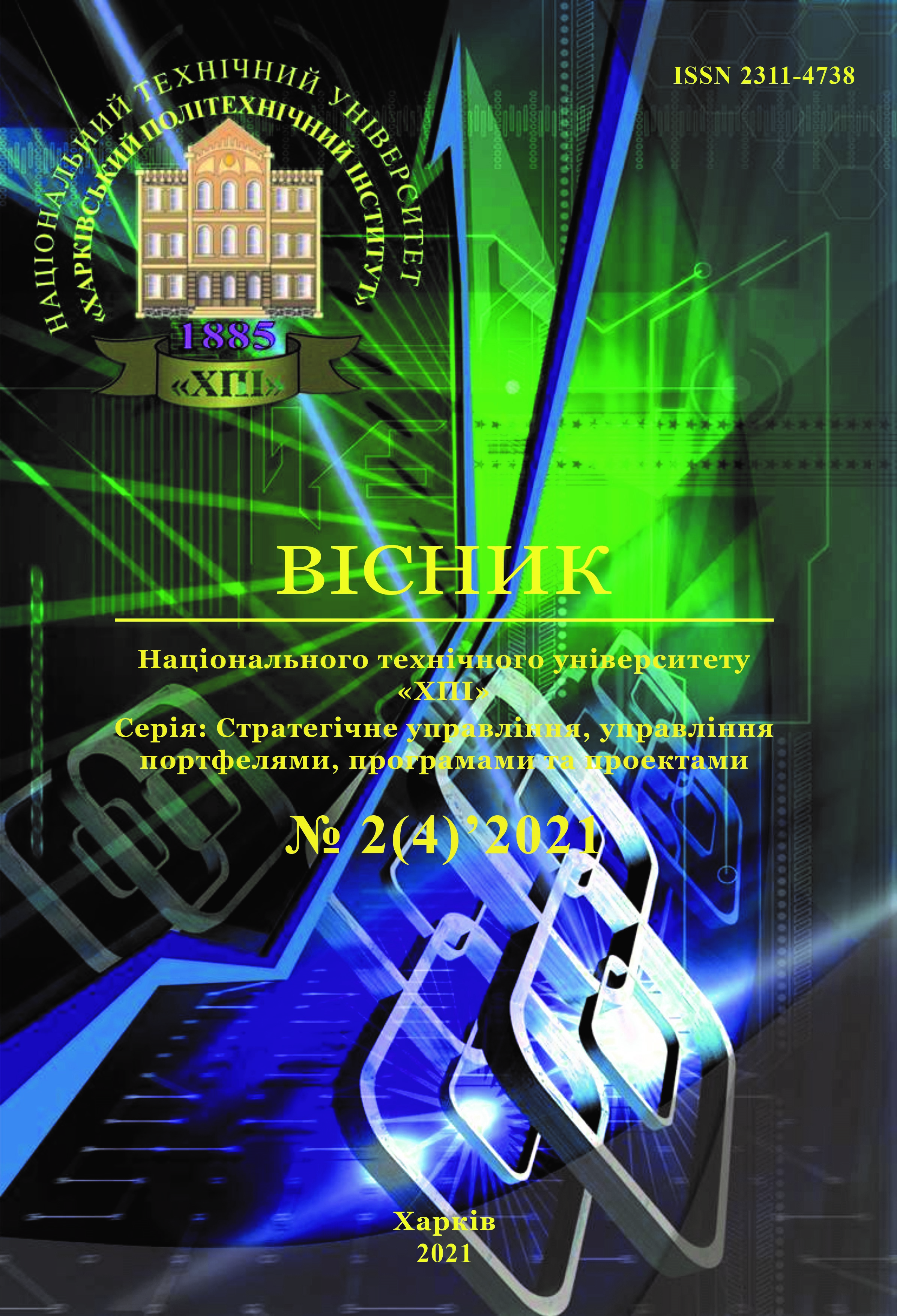FORMATION OF TIME PARAMETERS OF THE LIFE CYCLE OF AN ECOLOGY SYSTEM PROJECT
DOI:
https://doi.org/10.20998/2413-3000.2021.4.5Keywords:
ecological system, project life cycle, phases and stages of the life cycle, life cycle model, time characteristics of the life cycleAbstract
The article is devoted to the study of the features of the life cycle of an ecological system project, the functioning of which is based on the principles of circular economy as a modern economic model that allows achieving the goals of sustainable development. The relevance of the presented research is confirmed by the need to take into account the eco-destructive impact on the environment in the implementation of economic activities, since the technogenic linear type of economy created over the past centuries has led to an environmental crisis and turned out to be unable to ensure balanced civilizational development without damage to the environment. The issues of the structure of the life cycle of an ecological system project are considered, which takes into account the ecological orientation of this type of projects. It is proposed to include five phases in the life cycle of an ecological system project: pre-investment, investment, operational, regenerative and revitalization, which are divided into stages during which the intermediate result of the project is created. Using the tools of category theory, a graphical model of the project life cycle was created, in which successive and overlapping links are established between phases. The links between the stages of the life cycle are analyzed, represented by objects (domains and codomains) and morphisms (sequential and parallel, incoming and outgoing) of the category «Life Cycle of an Ecological System Project». The relationship between the duration of stages of the same or different phases of the project life cycle has been determined. The time parameters of the phases, stages and time intervals of the project life cycle have been determined. A mathematical model of the life cycle of an ecological system project is presented for two options for determining the duration of the life cycle: strictly and loosely defined. A compensation mechanism has been proposed to stabilize the life cycle duration in the case of its strict definition, which provides for the adjustment of the duration of codomains in certain morphisms of the category.
References
Руденко С.В., Ковтун Т.А. Екологізація логістики як напрямок реалізації концепції сталого розвитку. Проектний та логістичний менеджмент: нові знання на базі двох методологій. Том 3: монографія / авт. кол. С.В. Руденко, І.О. Лапкіна та ін. Одеса: КУПРИЄНКО СВ. 2020. С. 7-24.
Ковтун Т.А. Впровадження принципів циркулярної економіки для досягнення цілей сталого розвитку. Розвиток методів управління та господарювання на транспорті. 2020. № 3 (72). С. 22-42. DOI 10.31375/2226-1915-2020-3-22-42.
Ellen MacArthur Foundation: Towards a Circular Economy: Business Rationale For An Accelerated Transition. Ellen MacArthur Foundation, 2015. URL:https://www.ellenmacarthurfoundation.org/assets/downloads/TCE_Ellen-MacArthur-Foundation-9-Dec-2015.pdf
ГОСТ Р ИСО/МЭК 12207-2010. Национальный стандарт Российской Федерации. процессы жизненного цикла программных средств. М., 2010. 188с.
A Guide to the Project Management Body of Knowledge (PMBoK). Six Edition. USA. PMI, 2017. 574 p.
ГОСТ Р ИСО 21500-2014. Национальный стандарт Российской Федерации. Руководство по проектному менеджменту. М., 2014. 60 с.
P2M «Program & Project Management for Enterprise Innovation». 2016. Project Management Association of Japan. URL:: http://www.pmaj.or. jp/ENG/p2m/p2m_guide/p2m_guide.html
Ковтун Т.А. Фреймове моделювання продуктів проєкту екологістичної системи. Розвиток транспорту. Наук. журнал, 2020. Вип. 1(6). С. 17-29.
Международный стандарт ISO 14001:2015. Системы экологического менеджмента. Требования и руководство по применению. 2015. 46 с.
ГОСТ Р ИСО 14044-2019. Национальный стандарт Российской Федерации. Экологический менеджмент. Оценка жизненного цикла. Теория и требования. М., 2019. 48 с.
ГОСТ Р ИСО 37101-2018. Национальный стандарт Российской Федерации. Устойчивое развитие в сообществах. Система менеджмента. Общие принципы и требования. М. 2018. 45 с.
Городенцев А.Л. Введение в теорию категорий и гомологическую алгебру. М. 2018. 137 с.
Downloads
Published
Issue
Section
License

This work is licensed under a Creative Commons Attribution-NonCommercial-ShareAlike 4.0 International License.
Our journal abides by the Creative Commons copyright rights and permissions for open access journals.
Authors who publish with this journal agree to the following terms:
Authors hold the copyright without restrictions and grant the journal right of first publication with the work simultaneously licensed under a Creative Commons Attribution-NonCommercial-ShareAlike 4.0 International License (CC BY-NC-SA 4.0) that allows others to share the work with an acknowledgement of the work's authorship and initial publication in this journal.
Authors are able to enter into separate, additional contractual arrangements for the non-commercial and non-exclusive distribution of the journal's published version of the work (e.g., post it to an institutional repository or publish it in a book), with an acknowledgement of its initial publication in this journal.
Authors are permitted and encouraged to post their published work online (e.g., in institutional repositories or on their website) as it can lead to productive exchanges, as well as earlier and greater citation of published work.

